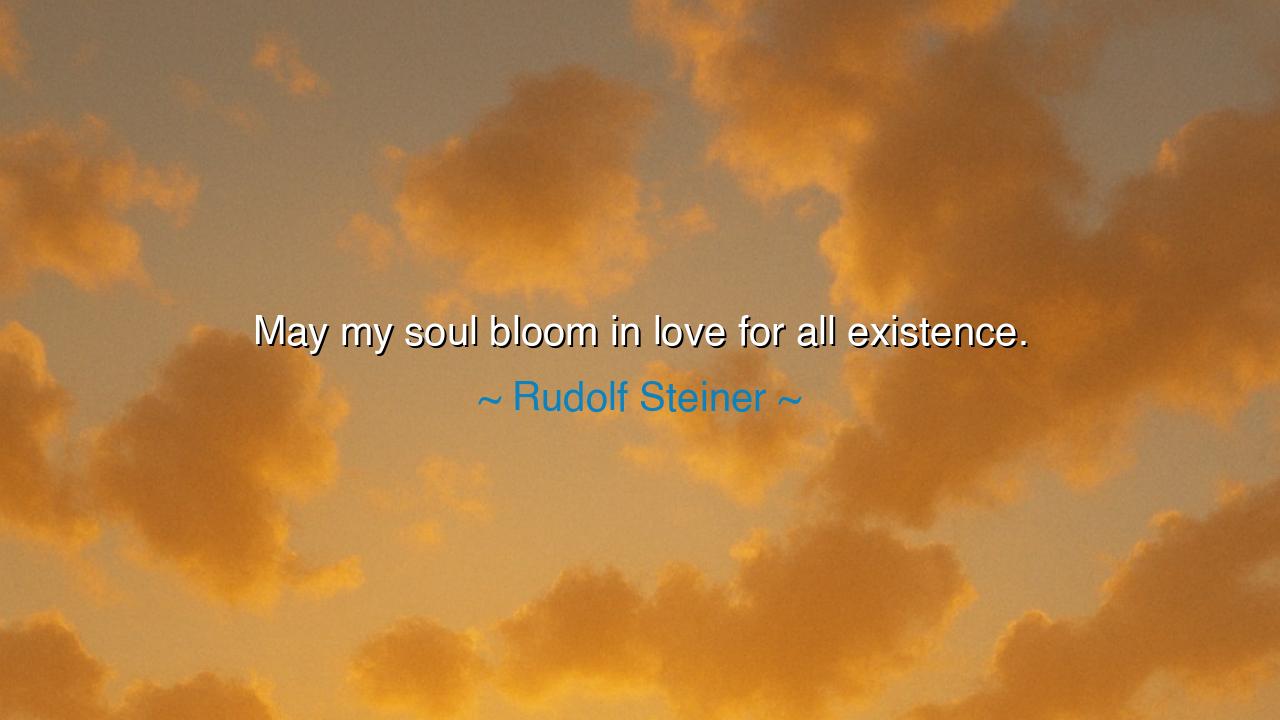
May my soul bloom in love for all existence.






In the voice of radiant wisdom, Rudolf Steiner, the philosopher, mystic, and founder of Anthroposophy, once wrote: “May my soul bloom in love for all existence.” These words are both prayer and proclamation — a yearning for the highest form of human awakening. They speak to the divine potential within every heart: to bloom — to unfold — in love so vast that it embraces all that lives, all that breathes, and even all that simply is. In this brief yet eternal utterance, Steiner captures the essence of spiritual evolution — the transformation of the human soul from self-centeredness into universal compassion.
The origin of this thought springs from Steiner’s lifelong quest to unite science and spirit, to bridge the visible and the invisible. He believed that humanity’s purpose is not only to think and act, but to love consciously, to live in harmony with the entire web of creation. To “bloom in love” is, in his vision, the natural flowering of a soul that has matured through understanding and service. Just as a flower turns toward the sun, so too does the human soul turn toward the divine warmth of love — not the love of possession or passion, but the love of being, the love that recognizes itself in every creature and every star.
To bloom is not to expand in arrogance but to unfold in grace. A flower does not force itself open; it yields to the light. So too must the soul yield to compassion, to understanding, to reverence for life. Steiner’s words remind us that love is not merely an emotion — it is a state of being, a harmony that can be cultivated until it radiates from us as naturally as fragrance from a rose. When one’s soul blooms in this way, every encounter becomes sacred, every act becomes service, and every breath becomes prayer. This is not the love of one person or one nation, but the love that belongs to eternity — the love for all existence.
Consider the life of Saint Francis of Assisi, who walked barefoot upon the earth, greeting the wind, the water, the wolf, and the poor alike as brothers and sisters. His was a soul that had truly bloomed in love for all existence. To him, the sun was not merely light but a divine presence; the sparrow was not a mere bird but a hymn of creation. In his tenderness toward all living things, we see the fulfillment of Steiner’s prayer. Francis did not love selectively — he loved universally. His heart had transcended the walls of self and fear, and in doing so, it had touched the infinite. So too, Steiner’s words call us to this state of universal kinship — to see not separation, but communion in all things.
But such blooming does not come easily. The soil of the soul must be tilled through humility, patience, and suffering. A flower cannot grow without first pushing through the darkness of the earth. Likewise, our capacity for love deepens through pain — through the trials that soften our pride and awaken our empathy. The one who has suffered understands the ache of others and learns to love more gently. Thus, love is both the fruit and the reward of endurance. When the soul chooses love even in the face of fear, loss, or injustice, it begins to awaken its true nature — a nature that reflects the divine.
Rudolf Steiner envisioned a humanity guided not by greed or competition, but by the spiritual principle of interconnectedness. To love “all existence” is to see that every being, from the smallest ant to the mightiest mountain, has its place in the grand symphony of creation. When our hearts awaken to this truth, our actions change: we begin to live with reverence, to speak with kindness, to work with purpose. We see that what we do to the earth, we do to ourselves; what we do for another, we do for the whole. In this way, love becomes not a feeling, but a form of wisdom — the highest and most enduring wisdom of all.
So, dear listener, take this sacred prayer as your own: “May my soul bloom in love for all existence.” Let it be the seed you plant in your heart each morning. Water it with gratitude, nourish it with forgiveness, and guard it with mindfulness. When anger rises, return to love. When despair darkens the horizon, return to love. When life feels narrow, open your soul again to the boundless expanse of creation. For the one who lives in love for all existence becomes like the flower in Steiner’s vision — beautiful not because it tries, but because it is.
And thus, as Rudolf Steiner teaches, love is the destiny of the soul. To live without it is to remain a bud that never opens. To bloom in it is to become one with the eternal rhythm of the universe. So let your soul unfold, petal by petal, in compassion, in reverence, in joy — until your very being becomes a blessing to the world. For in that blooming, you will not only find love — you will become it.






AAdministratorAdministrator
Welcome, honored guests. Please leave a comment, we will respond soon